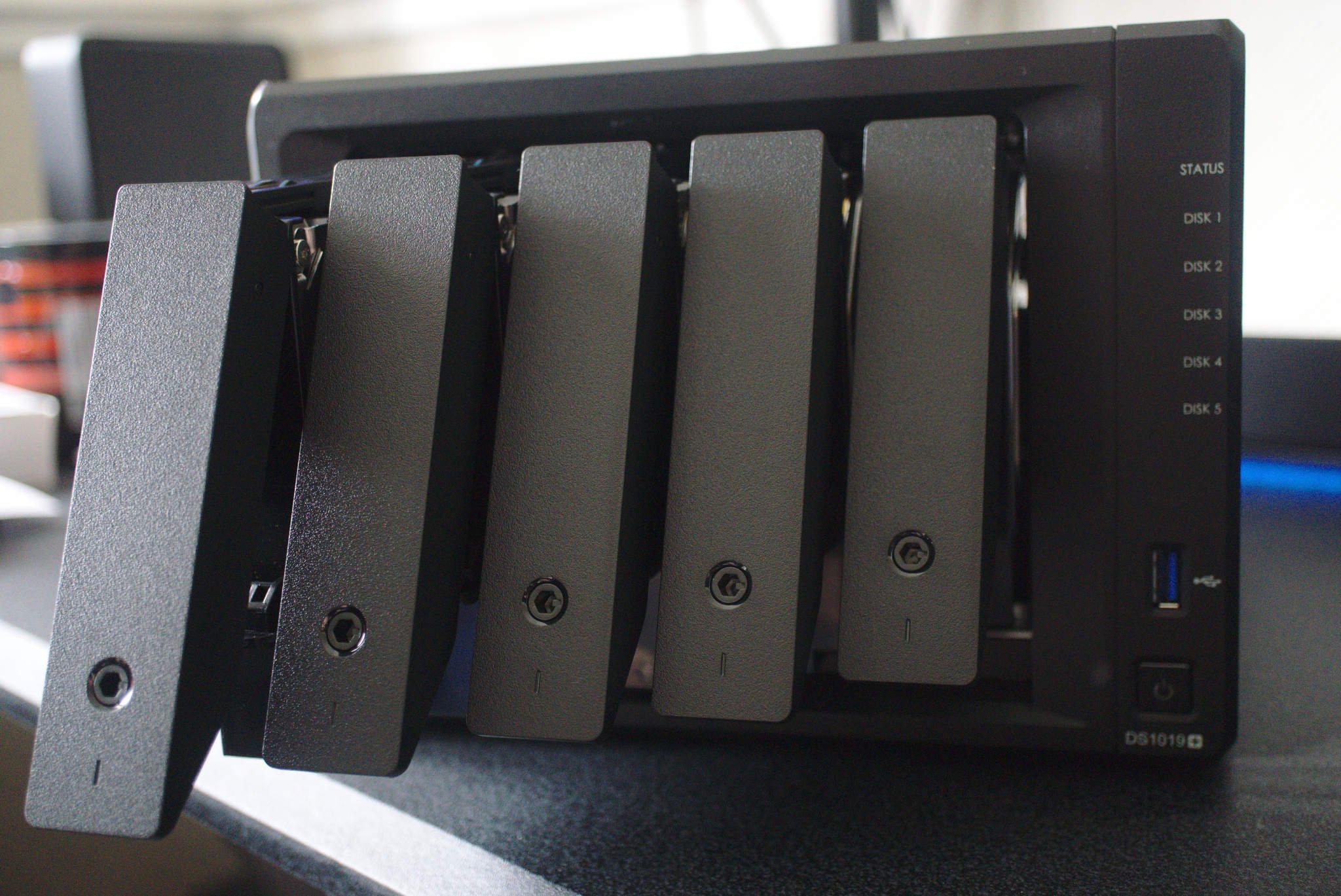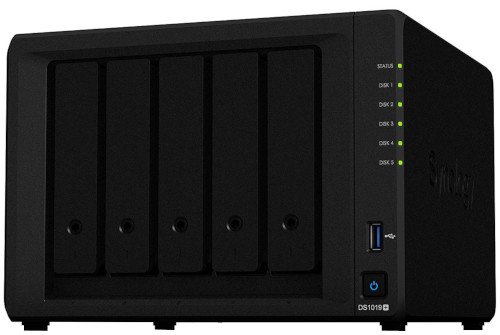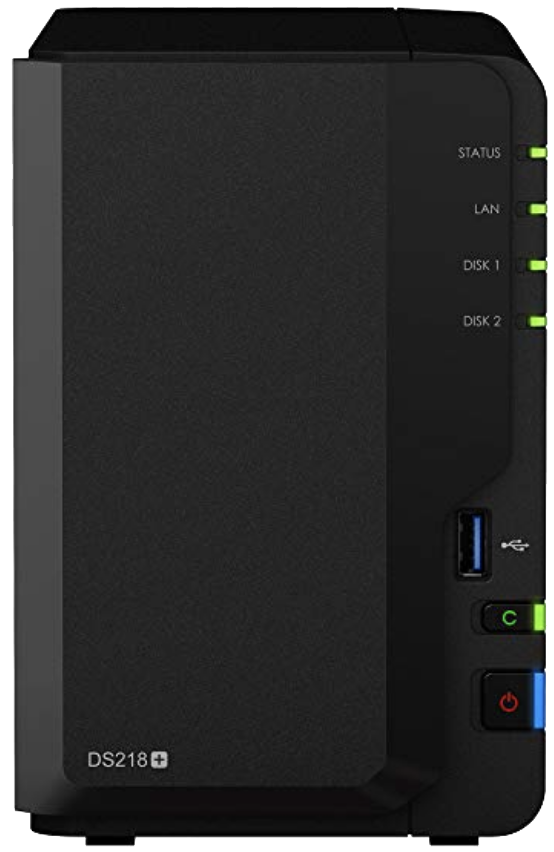Synology DS1019+ vs. DS218+: Which NAS should you buy?
Trying to figure out what NAS you need for your home server? We've tested numerous Synology NAS servers extensively so we can help you make the right decision.


High capacity
Synology took everything that made the DS218+ so good and added three additional bays, more RAM out the box, and even more features to make it an excellent NAS for anyone who requires ample amounts of storage.
For
- Great performance
- DSM OS
- Reliability
- More RAM pre-installed
- Five drive bays
Against
- More expensive
- No PCIe
- No 10GbE ports
- Can't upgrade RAM

Great value
The DS218+ is Synology's entry point for homeowners who require a small compact NAS server that supports two drives, countless third-party options, and doesn't break the bank.
For
- Cheaper
- DSM OS
- Reliability
- Upgradable RAM
- Uses less power
Against
- Two drive bays
- No PCIe
- No M.2 slots
- No 10GbE ports
Wanting to get started with your first NAS? DS218+ is the best option for you from Synology. Sporting two drive bays, you can install drives with a combined storage capacity of up to 28TB, but really you'll be limited to just 14TB with a proper RAID configuration for data redundancy. The DS1019+ is far more expensive and is better suited to those more familiar with NAS servers and who require more storage.
Comparing DS1019+ and DS218+ specs
The DS218+ comes equipped with 2GB of RAM, which can be bumped to 6GB, a dual-core Intel Celeron processor, two drive bays, and that's about it. All the basics are present, along with a host of USB 3.0 ports, LAN, and even eSATA. The DS1019+ takes it to the next level with a quad-core Intel Celeron processor, 8GB RAM, five drive bays, M.2 slots for SSD cache, and the same port layout except it trades one USB 3.0 port for a second LAN.
| Header Cell - Column 0 | DS1019+ | DS218+ |
|---|---|---|
| CPU | Intel Celeron J3455Quad-core1.5GHz (2.3GHz burst) | Intel Celeron J3355Dual-core2.0GHz (2.5GHz burst) |
| RAM | 8GB DDR3L (8GB max) | 2GB DDR3L (6GB max) |
| Bays | 5 | 2 |
| Capacity | 70TB | 28TB |
| M.2 slots | 2 | - |
| Ports | 2x GbE2x USB 3.01x eSATA | 1x GbE3x USB 3.01x eSATA |
| Dimensions | 166 x 230 x 223 mm | 165 x 108 x 223 mm |
| Weight | 2.54kg | 1.3kg |
| PSU | 120W | 60W |
| Consumption | 38.59W | 17.23W |
The DS1019+ on paper is more powerful than the more affordable DS218+. The quad-core processor is much better at handling more intensive tasks like streaming, and the 8GB pre-installed RAM allows for multiple services to be run simultaneously. Should you need even more speed, the two M.2 slots can house SSDs to act as cache. The DS218+ has no M.2 slot, though you can upgrade the RAM to 6GB.
Saving a few hundred on the DS218+ may be an issue further down the road should you need more storage or happen to hit a wall in terms of performance. Investing in the DS1019+ may be a solid option if you know you may need the additional power and drive bays at a later date. That said, even if you plan to use the NAS for Plex, the DS218+ is more than capable of becoming your first home media server.
Aside from the specifications, the NAS servers share the same DSM OS and design.
DS1019+ is perfect for serious storage
The only time you'll need the DS1019+ is when you have terabytes upon terabytes worth of data to store away and access remotely. The five drive bays allow you to store more than 70TB in total, making it ideal as a Plex Media Server with numerous movies, shows, and other media.

When you require more storage
The DS1019+ from Synology is an excellent NAS server that allows you to install up to five drives for a massive amount of storage space. You can run various supported apps and even run a Plex Media Server, but it's only worth purchasing instead of the DS918+ if you need the extra drive bay.
DS218+ is a fantastic first NAS
The DS218+ is the perfect first NAS with two drive bays and access to everything Synology's DSM OS has to offer. If you're looking for a server to start your own home media platform, you'll struggle to find better than the DS218+.
Get the Windows Central Newsletter
All the latest news, reviews, and guides for Windows and Xbox diehards.

Rich Edmonds was formerly a Senior Editor of PC hardware at Windows Central, covering everything related to PC components and NAS. He's been involved in technology for more than a decade and knows a thing or two about the magic inside a PC chassis. You can follow him on Twitter at @RichEdmonds.
